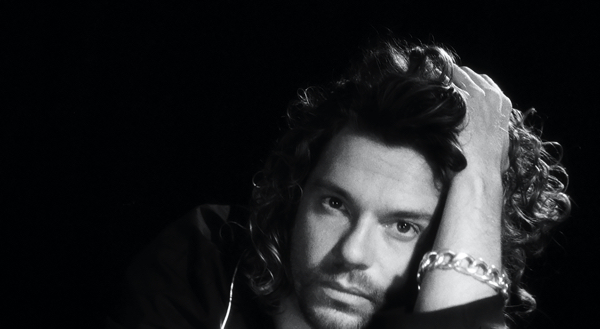
Dir.: Richard Lowenstein; Documentary with Michael Hutchence, Kylie Minogue, Helena Christensen, Michèlle Bennett, Tina Hutchence, Rhett Hutchence, Martha Troup; Australia 2019,
As writer and director Richard Lowenstein is more than qualified to put together this melancholic portrait of his endearing, snake-hipped compatriot Michael Hutchence (1960-1997), whose career as singer and frontman for INXS put him into the pantheon of rock music. Lowenstein not only shot most of the group’s music videos between the mid 1980s and the early90s, he also directed the singer in his only feature film appearance Dogs in Space (1986). Lowenstein certainly succeeded in “wanting to leave a legacy that was not the cliché rock star legacy”.
Low on musical performances but informative about Hutchence’s romantic interludes, these clearly shaped a life affected by the fault-lines of his childhood. There is a short interview with some close friends of Michael’s at primary school which informs the narrative early one:. “He did not seem to want to go home, he just lingered around”. When the future rock star’s parents, Kelland, a businessman, and Patricia, a model turned make-up artist, split up, Patricia took Michael with her to the USA, leaving Rhett with the father. Rhett later developed a drug problem which Michael thought was caused by his separation from his mother. His guilt complex went untreated, but later incidents, banal as well as dramatic, show that Michael’s personality was very much damaged from the outset.
His music was very much that of an undomitable hero, his relationships with women were full-blooded but short-lived – apart from the the relationship with Michèlle Bennett, today a film producer, which lasted seven years. Bennett was the only person who still knew him by the end of his life: ‘Never Tear Us Apart’ was a song which followed their breakup. There is a charming home movie of Michael and Kylie Minogue, lovers for two years, holidaying on a boat. Michael tried to explain to Kylie the motives of the murderer in Patrick Süskind’s Perfume, a dark, obsessional novel, which collided very much with Michael’s sunny music stage personality.
His relationship with Danish model Helena Christensen was overshadowed by an incident in 1992, when Michael suffered an unprovoked attack from a taxi driver in Copenhagen. The singer hit his head on the kerb, fracturing his skull. For one month Hutchence lay in a dark room, vomiting and eating next to nothing, before Helena was able to convince him to look for medical help. As it turned out, he had lost his sense of smell and taste. This lead to a personality change: Michael became moody, showing bi-polar symptoms, and spurts of aggression.
His relationship with Paula Yates started late in 1994, even though they were intimate long before. Yates, a famous writer and TV presenter, was married to the Boomtown Rats lead singer Bob Geldorf, the pioneer of “Band-Aid’. The couple had two daughters, and Geldorf took their divorce two years later very badly. After Yates gave birth to Michael’s first and only child Tiger Lily in the same year, Geldorf started a legal campaign trying to get custody of all three daughters. Geldorf was a celebrity, and Yates and Hutchence were hounded by the popular media. When Hutchence returned to Australia in preparation for an INXS concert tour at the end of 1997, he hoped Paula would visit him in Australia with the three daughters. But Geldof won an injunction, and the court case was adjourned to December. Hutchence was unable to bear being separated from his daughter, and committed suicide by hanging himself on 22nd November 1997. Yates died of an overdose in January 2000, her daughter Peaches in 2014, at the age of 25. Bob Geldorf adopted Tiger Lily, against the will of the Hutchence family.
Apart from Bono and Hutchence’s manager Martha Troup, we listen to the testimonies of band members Andrew, Jon and Tim Farris, as well as bassist Gary Beers, with Kirk Pengilly being not available. There are nine tracks from Hutchence and INXS, courtesy of Tiger Lily’s intervention with the copyright holders, who had blocked Lowenstein’s approaches before. Although their youthful faces appear on film, the comments we hear are the contemporary voices of the musicians. DoP Andrew de Groot mixes Hutchence’s own films, the home movies of his childhood and concert clips, avoiding Talking Heads as much as possible. We are left with a profound sadness, as Michael Hutchence, like most really gifted performers, was never sure of his talent, often believing he only “got the applause, because I wiggled my arse”. Lowenstein’s documentary is a true testament to sorrow.AS
IN CINEMAS 18 OCTOBER 2019